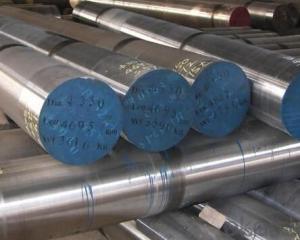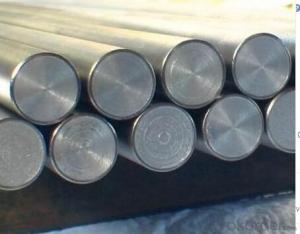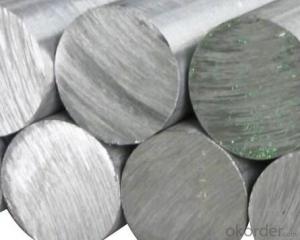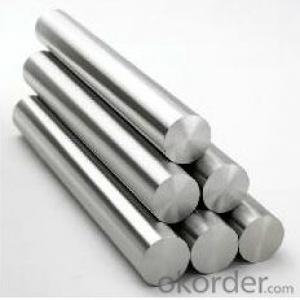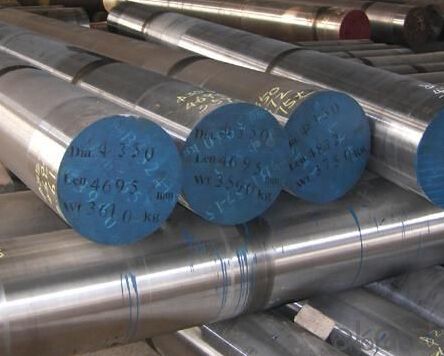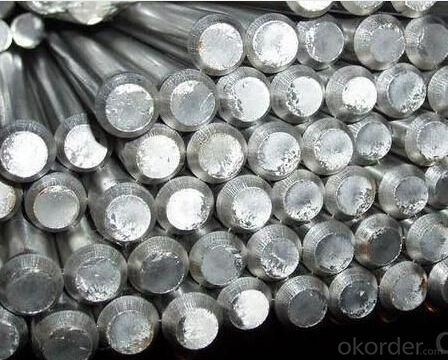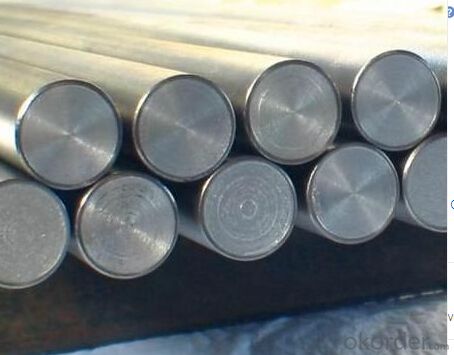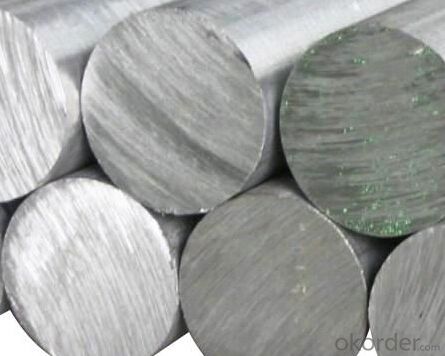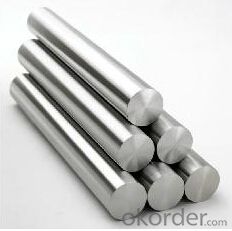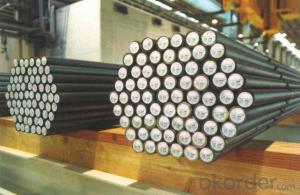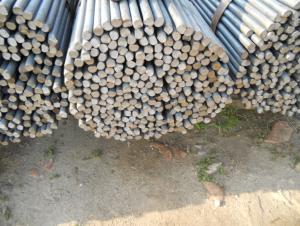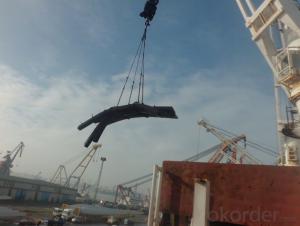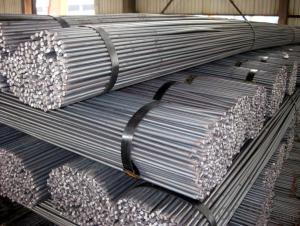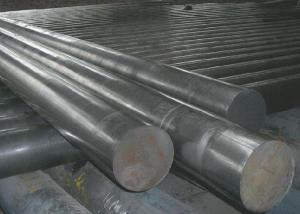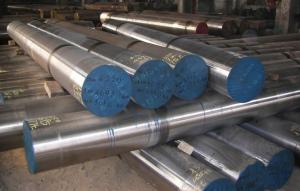Stainless Bearing Steel Round Bar
- Loading Port:
- China Main Port
- Payment Terms:
- TT or LC
- Min Order Qty:
- 50 m.t.
- Supply Capability:
- 1000 m.t./month
OKorder Service Pledge
OKorder Financial Service
You Might Also Like
Product Description:
OKorder is offering Stainless Bearing Steel Round at great prices with worldwide shipping. Our supplier is a world-class manufacturer of steel, with our products utilized the world over. OKorder annually supplies products to European, North American and Asian markets. We provide quotations within 24 hours of receiving an inquiry and guarantee competitive prices.
Product Applications:
Stainless Bearing Steel Round are ideal for structural applications and are widely used in the construction of buildings and bridges, and the manufacturing, petrochemical, and transportation industries.
Product Advantages:
OKorder's Stainless Bearing Steel Round are durable, strong, and resist corrosion.
Main Product Features:
· Premium quality
· Prompt delivery & seaworthy packing (30 days after receiving deposit)
· Corrosion resistance
· Can be recycled and reused
· Mill test certification
· Professional Service
· Competitive pricing
Specifications of Bearing Steel Round Bar
Grade | AISI 52100, ASTM E52100, DIN 1.3505,JIS SUJ2, GCr15 |
Dimensions | Diameter: 30-60mm Length: 2000-13000mm or as required |
Shape | Round Bar |
Type | Alloy Steel Bar |
Delivery Condition | Black Surface |
Material | Bearing Steel |
Technique | Hot Rolled |
Usage and Applications of Bearing Steel Round Bar
Bearing steels are used for ball and roller bearing applications and are comprised of low carbon steels and high carbon through harden able steel.
First the famous 1C-1.5Cr steel from which the majority of bearings are made. Its structure is apparently well-understood and the focus is on purity in order to avoid inclusions which initiate fatigue during rolling contact. Then there is the M50 steel and its variants, from which bearings which serve at slightly higher temperatures in aeroengines are manufactured, based on secondary-hardened martensite.
Tapered roller bearing are generally used to support combined load mainly consisting of radial load. Their cups are separable for easy assembling ,During mounting and using, radial clearance and axial clearance can be adjusted and preloaded mounting can be made.
Packaging & Delivery of Bearing Steel Round Bar
Packaging Detail: ASTM 52100 Steel in seaworthy packing or on customer request; Packed in bundles with standard export sea-worthy package or as customer require
Delivery Detail: 45 days after confirmed
Trade terms: FOB, CFR, CIF ou as customer's required
MOQ: 25 tons or at customer's demands. If the quantity is good, the price will be better.
Processing of Bearing Steel Round Bar
The processing of Bearing Steel Round Bar is hot rolled (strictly control sulphur, phosphorus and non-metallic inclusions content and distribution)
Chemical Composition of Bearing Steel Round Bar
C | Si | Mn | Cr | Ni | Cu |
Equal or less than | |||||
0.95-1.05 | 0.15-0.35 | 0.25-0.45 | Cr:1.40-1.65 | 0.30 | 0.25 |
All products' chemical composition and specification can be design according to customers' requirement.
Note of Bearing Steel Round Bar
1. According to national standard (GB) for our products, if not, supply according to national standards (GB) or agreement.
2. We can not only provide electric furnace +LF+VD and electros lag re-melting (ESR) steel forging materials, but also forging products of piece, bar, etc.
3. Our company is equipped with roll equipment and can provide our customers with roll billets or finished.
4. Please send us your detailed specifications when inquire. We will reply to you ASAP.
5. Certificate of quality is issued in English, in addition the normal terms, production process, the mechanical property (yield strength, tensile strength, elongation and hardness. forged ratio, UT test result, Grain size, heat treatment methods and the sample of is shown on the certificate of quality.
FAQ:
Q1: Why buy Materials & Equipment from OKorder.com?
A1: All products offered byOKorder.com are carefully selected from China's most reliable manufacturing enterprises. Through its ISO certifications, OKorder.com adheres to the highest standards and a commitment to supply chain safety and customer satisfaction.
Q4: What makes stainless steel stainless?
A4: Stainless steel must contain at least 10.5 % chromium. It is this element that reacts with the oxygen in the air to form a complex chrome-oxide surface layer that is invisible but strong enough to prevent further oxygen from "staining" (rusting) the surface. Higher levels of chromium and the addition of other alloying elements such as nickel and molybdenum enhance this surface layer and improve the corrosion resistance of the stainless material.
Q5: Can stainless steel rust?
A5: Stainless does not "rust" as you think of regular steel rusting with a red oxide on the surface that flakes off. If you see red rust it is probably due to some iron particles that have contaminated the surface of the stainless steel and it is these iron particles that are rusting. Look at the source of the rusting and see if you can remove it from the surface.
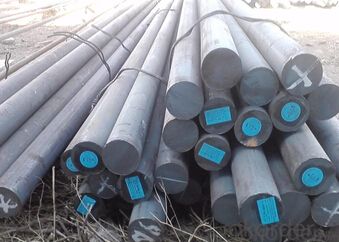
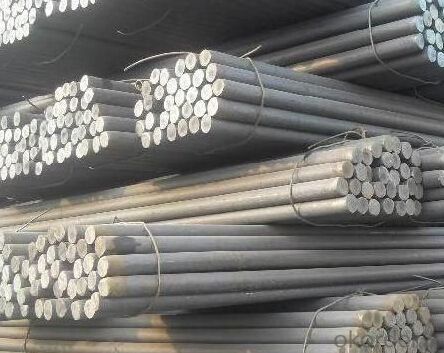
- Q: How does special steel contribute to the overall economy?
- Special steel contributes to the overall economy in several ways. Firstly, it plays a crucial role in various industries such as automotive, construction, and manufacturing, where it is used for producing high-performance components and structures. This fosters innovation, enhances productivity, and drives economic growth. Additionally, the production and processing of special steel create employment opportunities, both directly and indirectly, stimulating job growth and income generation. Moreover, special steel exports contribute to trade balance and foreign exchange earnings, further bolstering the economy. Overall, the utilization of special steel in diverse sectors strengthens industrial competitiveness, supports economic development, and fuels economic prosperity.
- Q: What are the properties of leaded steel?
- Leaded steel is a type of steel alloy that contains a small percentage of lead. This addition of lead provides several properties to the steel, including improved machinability, enhanced lubricity, and better chip formation during machining processes. Leaded steel also exhibits increased resistance to wear and galling, making it suitable for applications in which friction and sliding contact occur. Additionally, leaded steel has good corrosion resistance and can be easily welded and formed. However, it is important to note that leaded steel should be handled with caution due to the potential health hazards associated with lead exposure.
- Q: How does special steel contribute to the toughness of products?
- Special steel contributes to the toughness of products in several ways. Firstly, special steel is known for its high strength and durability. It is manufactured using specific alloying elements and heat treatment processes, which enhance its mechanical properties and make it more resistant to wear and tear. This increased strength allows products made from special steel to withstand heavy loads, impacts, and harsh environments, making them tougher and less prone to breakage. Additionally, special steel has excellent corrosion resistance properties. This is achieved through the addition of specific alloying elements such as chromium and nickel, which form a protective layer on the surface of the steel, preventing rust and corrosion. The resistance to corrosion adds to the toughness of the products, as they can be used in corrosive environments without degradation or loss of performance. Special steel also offers improved heat resistance. It can withstand high temperatures without losing its structural integrity or mechanical properties. This is particularly important in industries such as aerospace, automotive, and energy, where components are exposed to extreme temperatures. The ability of special steel to maintain its toughness under high heat conditions adds to the overall reliability and longevity of the products. Furthermore, special steel can be customized to meet specific requirements. Manufacturers can tailor the composition and properties of the steel to suit the intended application. For example, different types of special steel alloys are used in the production of cutting tools, bearings, and structural components. By selecting the appropriate grade of special steel, manufacturers can optimize the toughness of their products, ensuring they can withstand the intended use and perform reliably. In conclusion, special steel contributes to the toughness of products through its high strength, corrosion resistance, heat resistance, and customizability. The unique properties of special steel make it an ideal material choice for a wide range of applications, where toughness and durability are crucial factors.
- Q: What are the challenges in casting special steel?
- One of the challenges in casting special steel is the high melting point of the material. Special steels often have a higher carbon content or alloying elements, which increases their melting point. This requires the use of specialized furnaces and techniques to reach and maintain the necessary temperature for casting. Additionally, special steels can be prone to defects such as porosity, inclusions, and segregation during the casting process. These defects can negatively impact the mechanical properties and overall quality of the steel, making it difficult to achieve the desired specifications. Therefore, strict control over the casting conditions, including temperature, mold design, and pouring techniques, is crucial to overcome these challenges and produce high-quality special steel castings.
- Q: What are the requirements for special steel used in corrosive environments?
- The requirements for special steel used in corrosive environments include high resistance to corrosion, especially against specific corrosive agents such as acids, alkalis, or saline solutions. The steel should possess a strong passive film formation ability, preventing further corrosion. It should also have good mechanical properties, including high strength and toughness, to withstand the harsh conditions. Additionally, the steel must possess good welding and fabrication characteristics, as well as be cost-effective and readily available.
- Q: What are the different casting grades of special steel?
- The different casting grades of special steel include low alloy steel, high alloy steel, stainless steel, tool steel, and heat-resistant steel.
- Q: How is special steel used in the packaging industry?
- Special steel is used in the packaging industry for a variety of applications such as manufacturing durable and corrosion-resistant containers, packaging machinery, and tools used in the packaging process. It provides strength, reliability, and longevity, ensuring the safety and protection of products during storage and transportation.
- Q: How does special steel perform in high-stress corrosion cracking environments?
- Special steel performs exceptionally well in high-stress corrosion cracking environments. Due to its unique composition and enhanced resistance to corrosion, special steel can withstand the combination of mechanical stress and corrosive agents, minimizing the risk of cracking or failure. This makes it a highly reliable and preferred material choice for applications in industries such as oil and gas, chemical processing, and marine engineering.
- Q: How does special steel perform in welding applications?
- Special steel, also known as alloy steel, performs exceptionally well in welding applications. Its unique composition, which includes various alloying elements such as manganese, chromium, and nickel, enhances its weldability and overall performance. The addition of these alloying elements significantly improves the strength, hardness, and corrosion resistance of the steel, making it highly suitable for welding applications. Special steel possesses excellent weldability, allowing for easy fusion and formation of strong and durable weld joints. Furthermore, the alloying elements in special steel also contribute to its heat resistance, making it capable of withstanding high temperatures during the welding process without losing its structural integrity. This property is particularly crucial in applications where welding involves high heat levels or prolonged exposure to extreme temperatures. Moreover, special steel exhibits good ductility and toughness, enabling it to withstand the stresses and strains associated with welding. It can effectively absorb and disperse heat during the welding process, minimizing the risk of distortion or cracking in the welded joints. In addition to its mechanical properties, special steel also offers excellent resistance to corrosion and oxidation. This makes it highly suitable for welding applications in environments where exposure to moisture, chemicals, or harsh weather conditions is a concern. The corrosion resistance of special steel ensures that the welded joints maintain their strength and integrity over time, even in challenging environmental conditions. Overall, the performance of special steel in welding applications is outstanding, owing to its excellent weldability, strength, heat resistance, and corrosion resistance. Its unique composition and properties make it a preferred choice for a wide range of welding projects, including structural fabrication, pipeline construction, automotive manufacturing, and many more.
- Q: What are the environmental considerations associated with special steel production?
- Special steel production can have several environmental considerations due to its resource-intensive nature and the emissions generated during the production process. One of the main environmental considerations associated with special steel production is the extraction of raw materials. Special steel requires specific alloys and additives, which often involve the extraction of rare or valuable metals. Mining for these materials can have significant environmental impacts, including habitat destruction, soil erosion, water pollution, and the release of toxic substances. Another consideration is the energy consumption during the production process. Special steel production involves several energy-intensive stages, such as melting, refining, and shaping. These processes typically rely on fossil fuels, which contribute to greenhouse gas emissions and air pollution. Additionally, the high temperatures required for steel production contribute to significant carbon dioxide emissions, a major contributor to climate change. Water usage is also a concern in special steel production. The production process requires a substantial amount of water for cooling, cleaning, and lubrication. This can lead to water scarcity and pollution if not managed properly. The effluents generated during the production process can contain heavy metals, acids, and other pollutants, which can harm aquatic ecosystems if not adequately treated. Waste generation is another environmental consideration. Special steel production generates various types of waste, including slag, dust, and sludge. These wastes can contain heavy metals, toxins, and other pollutants. Proper disposal or treatment of these wastes is essential to prevent pollution of soil, water, and air. Lastly, the transportation of raw materials and finished products in special steel production can contribute to carbon emissions and air pollution. The long-distance shipping of raw materials and finished steel products can add to the overall environmental footprint of the industry. In conclusion, special steel production has several environmental considerations, including the extraction of raw materials, energy consumption, water usage, waste generation, and transportation. To mitigate these impacts, companies should prioritize sustainable sourcing of raw materials, invest in energy-efficient technologies, promote water conservation and treatment practices, manage and minimize waste generation, and explore cleaner transportation options.
Send your message to us
Stainless Bearing Steel Round Bar
- Loading Port:
- China Main Port
- Payment Terms:
- TT or LC
- Min Order Qty:
- 50 m.t.
- Supply Capability:
- 1000 m.t./month
OKorder Service Pledge
OKorder Financial Service
Similar products
Hot products
Hot Searches
Related keywords
